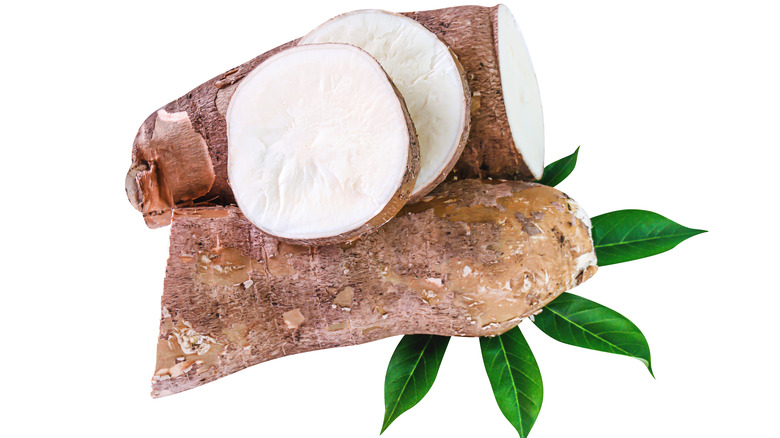The Tapioca Alcohol That's Served In The Himalayan Mountains
Human's proclivity for a drink goes back– alcohol has been consumed for 6,000 years, since Neolithic times. A social activity present in nearly all civilizations, inebriating beverages not only generate a buzz but also carry significant symbolic and cultural importance, explains the Social Issues Research Center. Intertwined with spirituality, many alcohols are consumed ceremonially — representing generational beliefs and traditions. In addition to reflecting nearby available ingredients, like agave-sap fermented pulque in Central America, or corn-based chicha in Peru, these beverages are a vessel for important symbolism, notes Alimentarium.
For the Lepcha people, who primarily live in the Himalayas in India's Sikkim province, the essential ritualistic drink is chi. Intertwined with deity, it's extended as an offering to God and used for social, religious, and medicinal purposes, per "Lepchas of the Khangchendzonga landscape, India." A type of low-percentage alcohol usually brewed with millet, it sometimes employs a unique fermented base — tapioca.
What is Tunglubuk chi?
Tunglubuk chi is a slow-fermenting alcohol created using red or white cassava tubers. The beverage is made by boiling the root vegetable, mixing it with millet, and then fermenting it with a rice and herb catalyst. If using a toxic variety of tapioca, the tuber is run through a stream before culinary use. It takes around a week for the process to happen — the result is a lightly colored, white extract. The consequent liquid is then pressed by hand and served in a bamboo cup with a bamboo straw, per Atlas Obscura.
The tapioca variety is part of a larger range of chi beverages, which have an ale-like taste. In addition to millet and tapioca, they frequently use rice, buckwheat, and wheat base, per Outlook Traveller. Tunglubuk chi is served warm and has a sweet flavor and thick texture. A soothing beverage brewed for centuries, Tunglubuk chi is disappearing due to the labor-intensive nature of its preparation. Combined with the dwindling Lepcha population, many worry its creation may soon disappear completely, per Slurrp.
The cultural significance of Tunglubuk Chi
In Lepcha belief, the beverage is offered to the tribe's deity, Kanchenjunga, intertwined with the world's third-tallest mountain (per Britannica). As an ode to their believed emergence from the peak, Tunglubuk Chi has rich cultural significance when served during births, marriages, and to guests (via Atlas Obscura).
Varieties of Chi, especially the more common millet type, are part of both daily life and ceremony. Nourishing, in addition to intoxicating, the drink is consumed every day. Known for its spiritual origins, Lepcha people describe it as "blood that flows through the body." Used to both ward off demons and to gratify the Gods, Chi is present at birthing ceremonies, with a few drops put into the infant's mouth right after naming. It is also used during marriage, and funeral rites, as outlined by Dr. Shera Pandi Molommu in "Chi- The Traditional Drink of the Lepchas: A Case Study." Culturally significant in this nook of Himilayas, calling chi simply a drink is an understatement — it's a pillar of life.


